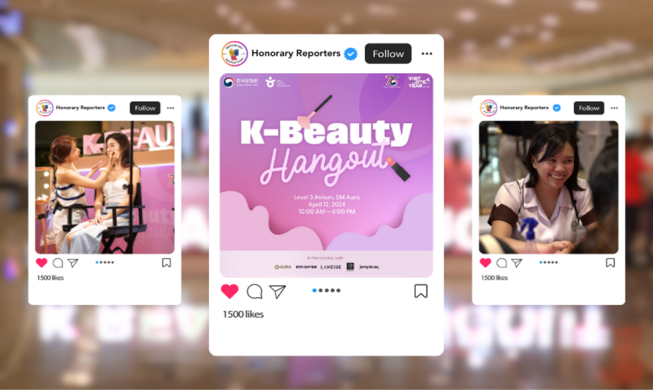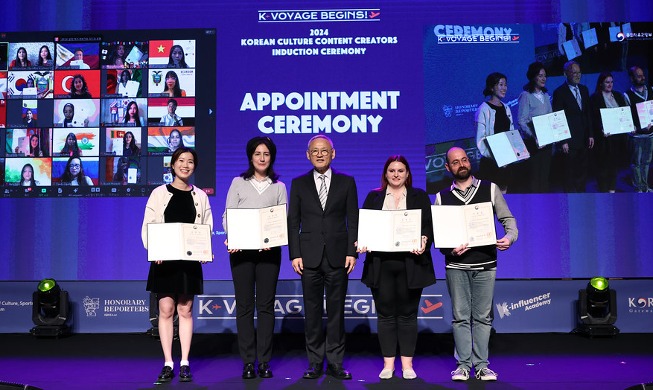-
 Korea.net's 24-hour YouTube channel
Korea.net's 24-hour YouTube channel- NEWS FOCUS
- ABOUT KOREA
- EVENTS
- RESOURCES
- GOVERNMENT
- ABOUT US
In Europe, the home of classical music, there is one highly-recognized Asian conductor, often called the conductor “whose strokes of a baton create touching music.” That is Korean conductor Lee Young-chil.
The 44-year-old has conducted across Europe, including in the U.K., Poland, Russia, the Czech Republic, Hungary, Serbia and Bulgaria. Since 2006, the musician has served as a tenured foreign guest conductor at the Plovdiv State Philharmonic Orchestra based in Bulgaria. He has also been a permanent conductor at the Bosnia-based Sarajevo Philharmonic Orchestra since 2007 and at the Bohemian Symphony in Prague, the Czech Republic, for more than six years, starting in 2008.
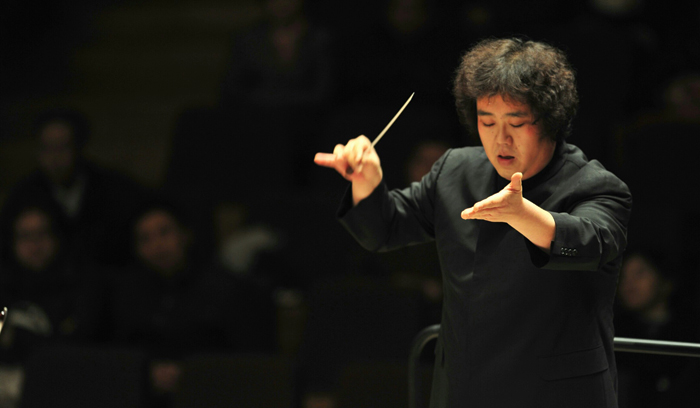
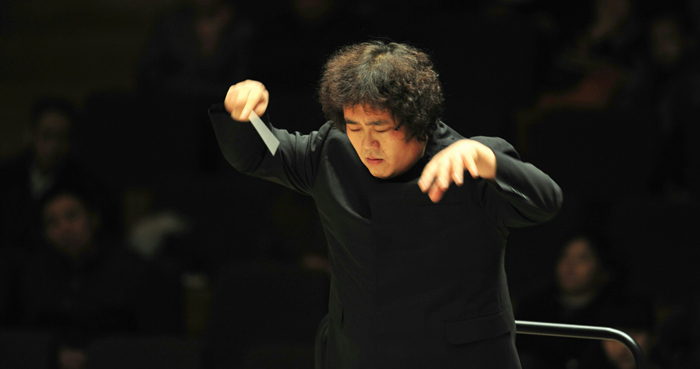
Rounding out his resume, Lee has led the Sofia Philharmonic Orchestra and the Pleven Philharmonic Orchestra, both in Bulgaria, as a tenured guest conductor since 2009 and 2010, respectively. Also, Lee was chosen as a permanent conductor for both the Janacek Philharmonic Orchestra in the Czech Republic and the Opole Philharmonic Orchestra in Poland in 2011 and 2012, respectively. The world-class Moscow Philharmonic Orchestra and the most lauded of Japanese orchestras, the NHK Symphony Orchestra, have been graced with Lee's conducting, as well.
The classical world has had numerous musicians who were born with perfect pitch. Such natural musical talent, however, has nothing to do with this conductor. He did not have an inborn talent for music, nor did he graduate from an arts high school. In earlier times, he didn't even have any interest in music at all.
Lee's first musical encounter was when he started learning to play the French horn, comparatively late at the age of 19. Determined to become a hornist, he went to the U.S. in 1989 to study and earned both a bachelor’s and a master’s at the Mannes College of Music in New York in 1996 and 1997. After that, he went on to obtain a doctorate in performing arts at the State University of New York in 2000.
One day, he realized his ability would not progress any further and he had no choice but to switch into the conducting course. As he had to learn conducting skills from scratch, he travelled to Bulgaria where he entered the National Academy of Music in Sofia.
"I chose the city of Sofia where tuition was relatively affordable, as I didn't have enough money at the time," Lee said. "After I began realizing that 'This is my destiny,' things started to work out well for me."
From that point on, he has built his career, leading more than 300 performances in over ten European nations. "Whenever I am called up to stage with the announcement of my country and my name, I feel very proud to be Korean," he said.
The conductor most recently conducted a New Year’s concert with the Moscow Philharmonic Orchestra on January 25. This was his third collaboration with the Russian orchestra, after his first concert back in 2011 when he became the first Asian to lead the orchestra under his baton.
The Moscow orchestra, established in 1951, is Russia's top national orchestra, with a history of leading conductors such as Franz Konwitschny, Kirill Petrovich Kondrashin, Zubin Mehta and Lorin Maazel.
Korea.net talked with Lee Young-chil, who just got back to Korea after his Russian concert, to hear more about his musical journey as a conductor.
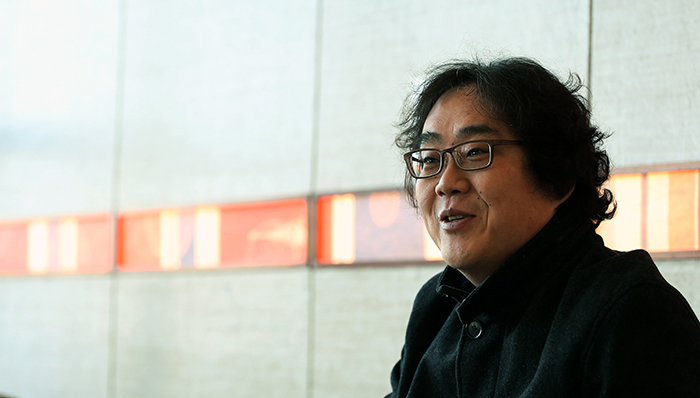
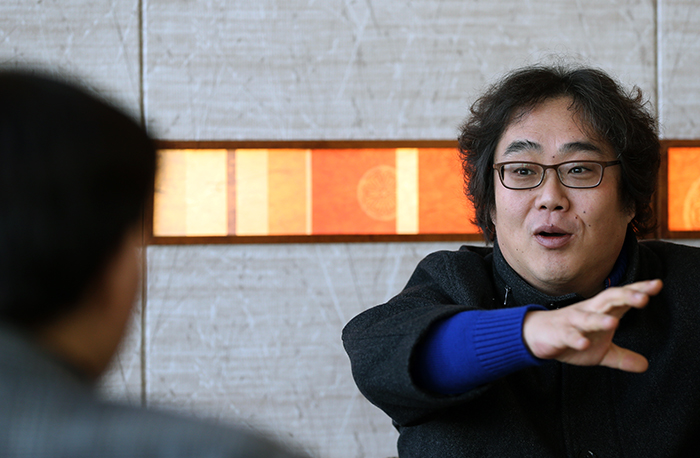
1. You once again conducted the Moscow Philharmonic Orchestra on January 25. Tell us how you felt.
Russia is a musical stage on which any classical musician dreams to be. The Moscow Philharmonic Orchestra is the country's best orchestra. This is my third time to lead this orchestra. The concert was designed for up-and-coming classical players in the nation. The concert hall, with 1,300 seats, was filled with a Moscow audience including only four Koreans.
I thought, "How great would it be if I stood on this stage together with a Korean orchestra?" There are not yet many Korean musicians capable and ready enough to keep up with their Russian counterparts, I think. If any chance is to be given, I wish to conduct young Korean talented musicians for a foreign audience.
2. You've been active mainly across Europe, including Britain, Russia, the Czech Republic, Hungary, Serbia and Bulgaria. When was the most memorable and happiest moment in your career?
The most deep-seated memory in my mind is when I conducted on New Year's Eve and New Year’s Day last year in Hamburg, Germany. Those concerts, held on December 31 and January 1 every year, are the nation's two biggest festivals. I was invited to such great concerts. There, I conducted Beethoven's Symphony No. 9, "The Choral," which has been considered the most difficult piece among Beethoven's work.
It must have been a sort of "adventure" for the nation to invite a Korean conductor like me to its two greatest musical festivals, I guess. The biggest compliment in Europe is not receiving a standing ovation, but having the audience stamp their feet. That's what I got, and I felt so happy. I know that I was the first Korean to conduct at those two national events.
3. You started playing the French horn at 19 and majored in the instrument in New York. What made you choose the French horn as a way to build your musical career? Tell us more about why you had to change from being a hornist to being a conductor.
Most people think that musicians have a natural-born talent for music. That is not the case for me. What led me to start music was in order to enter a university. I started by playing the French horn, but suddenly I couldn't make beautiful sounds with the instrument I had been playing for more than a decade. The next choice was to become a conductor. I didn’t expect, or even want to, become one. To be honest, being a conductor was the last bastion of my music.
4. There are many musicians endowed with musical talent. In contrast, you started music a little late. Nonetheless, you have now grown into a conductor who has led many orchestras. What's your secret?
I was born into a family that was far from music. My parents conducted business and none of my family had anything to do with music. When I started playing the French horn, everyone called me "a freak." Some people are born with musical talent and I think such talent can be developed as they grow.
Many people say that those who don't have a natural talent will not grow, but that's not true. I think Mozart was the only one musical genius on earth. He did all his composition in such a short period of time. He is known to have completed the composition of his masterpiece, "The Magic Flute," in just four days. It is an art that one can do until he dies. That's why I think time is not that important in the arts. Along with an extraordinary musical sense, the remaining elements in success come from interest in music and ceaseless effort to improve one’s musical skill. As I started learning how to conduct, I’ve come to know more about music, inside out.
I always wish that a single day would not go by without me conducting, until I take my last breath. Nothing makes me happier than when I hold my baton and conduct on stage. The love for, and steady interest in, music has kept me going and has made me who I am now.
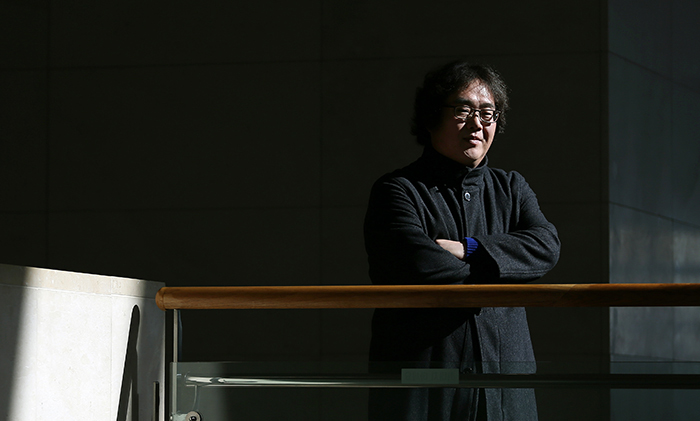
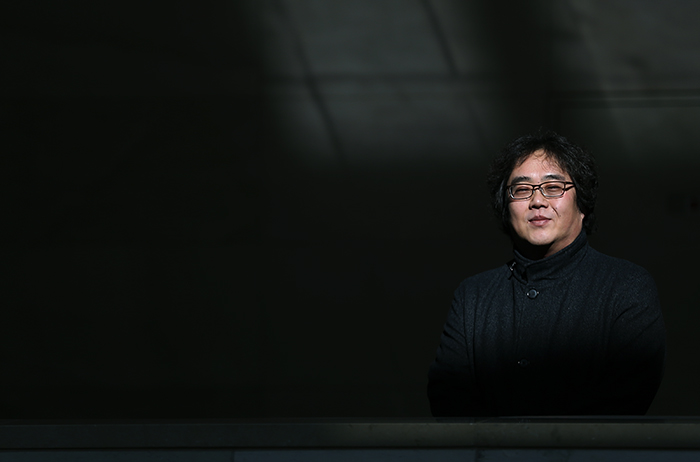
5. Who's your role model?
I would say Herbert von Karajan (1908-89). That conductor is the one person who made great contributions to making the Berlin Philharmonic Orchestra one of the world's best orchestras. I think he did more than 100 percent as a conductor. All by himself, Karajan brought back to life a then-dying classical music scene. He was also the kind of person who provided for some of his orchestra members who were worse off. With all the albums he released through Deutsche Grammophon, the German classical record label, the conductor contributed greater than anyone else to expanding the base for classical music.
6. You must have had some difficulties in overcoming cultural and linguistic differences with European orchestra members.
Nothing. Music is all the same, no matter what country. Every piece of music is made up of common notes. If my partners don’t respect me, they ignore my music. Since I perfectly create music, they respect and follow me. A conductor must expand his orchestra’s repertoire and practice every single day.
I’ve accumulated lots of experiences, conducting for more than 300 concerts. Unlike many conductors, I don’t memorize a score. For Beethoven, with a hearing impairment, he put everything onto his scores. His work can be conducted from memory, but genuine music cannot be created in that way, I think.
The strong point of music is to allow performers to express it with their own feelings. That’s why music generated by conductors has different colors. Tchaikovsky’s masterpieces have been performed by a good many musicians. The works hold the same musical notes and scores. The reason why his works have been so much loved until now is that they all have been played with quite different feelings by different musicians.
7. There has been a constant rise in the number of Korean musicians making inroads onto overseas stages, like you. Is there anything to say to them?
They all are doing well, so there is nothing special to say. If I am to give them a piece of my advice, it is, “You must compete with your own skills, create things audiences will love to listen to and expand your repertoire.”
It is more important to give them more opportunities to go further and perform in front of as many foreign audiences as possible. That’s much more important than winning a competition. They should have the guts to bring their music out there and to look for any chance to show off what they’ve got. That is not something that can be achieved by themselves. Government-level support and skilled conductors should follow.
As a conductor who was lucky enough to have seized the rare opportunity to tap into the European classical music world, I’d like to help make traditional Korean music, or gugak, well-known all around the world. I think that only one piece of Korean music could make a big difference. In order to draw a bigger audience, the genre should be made more Westernized and easier to appreciate. Any music I create sounds Korean. In that regard, I can help spread what Korean music sounds like, to some degree.
8. What’re your future plans?
I will have a concert tour of Italy and across Europe. The European tour is a first for me. I hope to have the chance to perform for Korean audiences, as well.
By Sohn JiAe
Korea.net Staff Writer
jiae5853@korea.kr
The 44-year-old has conducted across Europe, including in the U.K., Poland, Russia, the Czech Republic, Hungary, Serbia and Bulgaria. Since 2006, the musician has served as a tenured foreign guest conductor at the Plovdiv State Philharmonic Orchestra based in Bulgaria. He has also been a permanent conductor at the Bosnia-based Sarajevo Philharmonic Orchestra since 2007 and at the Bohemian Symphony in Prague, the Czech Republic, for more than six years, starting in 2008.


Lee Young-chil conducts the orchestra. (Photo courtesy of MENOMUSIC)
Rounding out his resume, Lee has led the Sofia Philharmonic Orchestra and the Pleven Philharmonic Orchestra, both in Bulgaria, as a tenured guest conductor since 2009 and 2010, respectively. Also, Lee was chosen as a permanent conductor for both the Janacek Philharmonic Orchestra in the Czech Republic and the Opole Philharmonic Orchestra in Poland in 2011 and 2012, respectively. The world-class Moscow Philharmonic Orchestra and the most lauded of Japanese orchestras, the NHK Symphony Orchestra, have been graced with Lee's conducting, as well.
The classical world has had numerous musicians who were born with perfect pitch. Such natural musical talent, however, has nothing to do with this conductor. He did not have an inborn talent for music, nor did he graduate from an arts high school. In earlier times, he didn't even have any interest in music at all.
Lee's first musical encounter was when he started learning to play the French horn, comparatively late at the age of 19. Determined to become a hornist, he went to the U.S. in 1989 to study and earned both a bachelor’s and a master’s at the Mannes College of Music in New York in 1996 and 1997. After that, he went on to obtain a doctorate in performing arts at the State University of New York in 2000.
One day, he realized his ability would not progress any further and he had no choice but to switch into the conducting course. As he had to learn conducting skills from scratch, he travelled to Bulgaria where he entered the National Academy of Music in Sofia.
"I chose the city of Sofia where tuition was relatively affordable, as I didn't have enough money at the time," Lee said. "After I began realizing that 'This is my destiny,' things started to work out well for me."
From that point on, he has built his career, leading more than 300 performances in over ten European nations. "Whenever I am called up to stage with the announcement of my country and my name, I feel very proud to be Korean," he said.
The conductor most recently conducted a New Year’s concert with the Moscow Philharmonic Orchestra on January 25. This was his third collaboration with the Russian orchestra, after his first concert back in 2011 when he became the first Asian to lead the orchestra under his baton.
The Moscow orchestra, established in 1951, is Russia's top national orchestra, with a history of leading conductors such as Franz Konwitschny, Kirill Petrovich Kondrashin, Zubin Mehta and Lorin Maazel.
Korea.net talked with Lee Young-chil, who just got back to Korea after his Russian concert, to hear more about his musical journey as a conductor.


Conductor Lee Young-chil (Photos: Jeon Han)
1. You once again conducted the Moscow Philharmonic Orchestra on January 25. Tell us how you felt.
Russia is a musical stage on which any classical musician dreams to be. The Moscow Philharmonic Orchestra is the country's best orchestra. This is my third time to lead this orchestra. The concert was designed for up-and-coming classical players in the nation. The concert hall, with 1,300 seats, was filled with a Moscow audience including only four Koreans.
I thought, "How great would it be if I stood on this stage together with a Korean orchestra?" There are not yet many Korean musicians capable and ready enough to keep up with their Russian counterparts, I think. If any chance is to be given, I wish to conduct young Korean talented musicians for a foreign audience.
2. You've been active mainly across Europe, including Britain, Russia, the Czech Republic, Hungary, Serbia and Bulgaria. When was the most memorable and happiest moment in your career?
The most deep-seated memory in my mind is when I conducted on New Year's Eve and New Year’s Day last year in Hamburg, Germany. Those concerts, held on December 31 and January 1 every year, are the nation's two biggest festivals. I was invited to such great concerts. There, I conducted Beethoven's Symphony No. 9, "The Choral," which has been considered the most difficult piece among Beethoven's work.
It must have been a sort of "adventure" for the nation to invite a Korean conductor like me to its two greatest musical festivals, I guess. The biggest compliment in Europe is not receiving a standing ovation, but having the audience stamp their feet. That's what I got, and I felt so happy. I know that I was the first Korean to conduct at those two national events.
3. You started playing the French horn at 19 and majored in the instrument in New York. What made you choose the French horn as a way to build your musical career? Tell us more about why you had to change from being a hornist to being a conductor.
Most people think that musicians have a natural-born talent for music. That is not the case for me. What led me to start music was in order to enter a university. I started by playing the French horn, but suddenly I couldn't make beautiful sounds with the instrument I had been playing for more than a decade. The next choice was to become a conductor. I didn’t expect, or even want to, become one. To be honest, being a conductor was the last bastion of my music.
4. There are many musicians endowed with musical talent. In contrast, you started music a little late. Nonetheless, you have now grown into a conductor who has led many orchestras. What's your secret?
I was born into a family that was far from music. My parents conducted business and none of my family had anything to do with music. When I started playing the French horn, everyone called me "a freak." Some people are born with musical talent and I think such talent can be developed as they grow.
Many people say that those who don't have a natural talent will not grow, but that's not true. I think Mozart was the only one musical genius on earth. He did all his composition in such a short period of time. He is known to have completed the composition of his masterpiece, "The Magic Flute," in just four days. It is an art that one can do until he dies. That's why I think time is not that important in the arts. Along with an extraordinary musical sense, the remaining elements in success come from interest in music and ceaseless effort to improve one’s musical skill. As I started learning how to conduct, I’ve come to know more about music, inside out.
I always wish that a single day would not go by without me conducting, until I take my last breath. Nothing makes me happier than when I hold my baton and conduct on stage. The love for, and steady interest in, music has kept me going and has made me who I am now.


Conductor Lee Young-chil poses for photos. (Photos: Jeon Han)
5. Who's your role model?
I would say Herbert von Karajan (1908-89). That conductor is the one person who made great contributions to making the Berlin Philharmonic Orchestra one of the world's best orchestras. I think he did more than 100 percent as a conductor. All by himself, Karajan brought back to life a then-dying classical music scene. He was also the kind of person who provided for some of his orchestra members who were worse off. With all the albums he released through Deutsche Grammophon, the German classical record label, the conductor contributed greater than anyone else to expanding the base for classical music.
6. You must have had some difficulties in overcoming cultural and linguistic differences with European orchestra members.
Nothing. Music is all the same, no matter what country. Every piece of music is made up of common notes. If my partners don’t respect me, they ignore my music. Since I perfectly create music, they respect and follow me. A conductor must expand his orchestra’s repertoire and practice every single day.
I’ve accumulated lots of experiences, conducting for more than 300 concerts. Unlike many conductors, I don’t memorize a score. For Beethoven, with a hearing impairment, he put everything onto his scores. His work can be conducted from memory, but genuine music cannot be created in that way, I think.
The strong point of music is to allow performers to express it with their own feelings. That’s why music generated by conductors has different colors. Tchaikovsky’s masterpieces have been performed by a good many musicians. The works hold the same musical notes and scores. The reason why his works have been so much loved until now is that they all have been played with quite different feelings by different musicians.
7. There has been a constant rise in the number of Korean musicians making inroads onto overseas stages, like you. Is there anything to say to them?
They all are doing well, so there is nothing special to say. If I am to give them a piece of my advice, it is, “You must compete with your own skills, create things audiences will love to listen to and expand your repertoire.”
It is more important to give them more opportunities to go further and perform in front of as many foreign audiences as possible. That’s much more important than winning a competition. They should have the guts to bring their music out there and to look for any chance to show off what they’ve got. That is not something that can be achieved by themselves. Government-level support and skilled conductors should follow.
As a conductor who was lucky enough to have seized the rare opportunity to tap into the European classical music world, I’d like to help make traditional Korean music, or gugak, well-known all around the world. I think that only one piece of Korean music could make a big difference. In order to draw a bigger audience, the genre should be made more Westernized and easier to appreciate. Any music I create sounds Korean. In that regard, I can help spread what Korean music sounds like, to some degree.
8. What’re your future plans?
I will have a concert tour of Italy and across Europe. The European tour is a first for me. I hope to have the chance to perform for Korean audiences, as well.
By Sohn JiAe
Korea.net Staff Writer
jiae5853@korea.kr
Related Contents
Most popular
- Event 'K-Beauty Hang Out' draws hundreds in Philippines
- Ceremony in Seoul inducts 2,641 content creators of Korean culture
- Cultural spring festival Seoul Festa to start on May 1
- 'Mad Max' director impressed by 'cinema-literate' Korean viewers
- President, Romania pledge better defense, nuclear power ties



